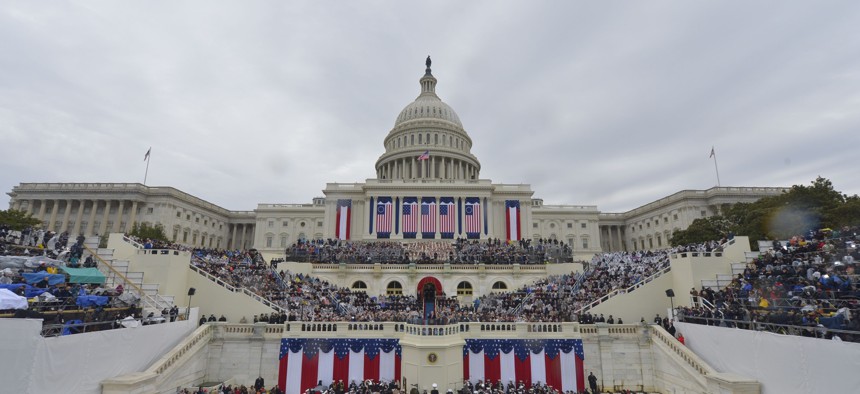
New OPM guidance detailed the pay and benefits procedures for political appointees leaving federal service on Inauguration Day. MANDEL NGAN / Getty Images
OPM outlines pay, benefits rules for appointees resigning on Inauguration Day
The federal government’s HR agency also highlighted the ramifications of Jan. 20 coinciding with Martin Luther King Day for D.C.-area federal workers.
The Office of Personnel Management on Tuesday issued guidance to agencies reminding them of how to handle the pay and benefits of political appointees who are set to resign ahead of President-elect Trump’s inauguration on Jan. 20.
In a memo to agency human resources directors, OPM associate director for workforce policy and innovation Veronica Hinton wrote that agencies should compensate appointees who are planning on resigning at noon on Inauguration Day—when Trump is slated to be sworn into office—for the hours they are scheduled to work before that time.
“Each agency is responsible for determining the hours of pay for each noncareer employee based on the employee’s work schedule for that day, prior to the termination of their appointment at noon (EST),” she wrote.
When it comes to leave accrual, things are a bit more complicated. Appointees covered by the Title 5 leave system, such as General Schedule employees on a Schedule C appointment or noncareer senior executives, will not accrue any annual or sick leave for the Jan. 12 through Jan. 25 pay period, because they are set to resign before the end of the pay period.
But some appointees are not covered by the Title 5 leave system, nor do they have a “scheduled tour of duty.”
“For such appointees who are located in the Eastern Time Zone, OPM believes it is appropriate to pay these individuals a half day’s pay (that is, four hours) because the 12 hours between midnight and noon (EST) on Jan. 20 represent half a day,” Hinton wrote. “Normally, leave-exempt presidential appointees receive pay for eight hours a day.”
Appointees who resign midway through Inauguration Day are due a full day of retirement credit for “any partial day of employment,” and their health insurance coverage through the Federal Employees Health Benefits Program will continue until the end of the biweekly pay period, or Jan. 25 in most instances. They also are entitled to a 31-day extension of their coverage, and they may elect to retain their FEHBP coverage for up to 18 months, provided they pay the entire insurance premium plus a 2% fee.
No extra holiday for D.C.-area feds
Hinton’s memo also addresses the fact that Inauguration Day, which Washington, D.C., area federal workers receive as a holiday due to the congestion resulting from the proceedings, happens to fall on another federal holiday: Martin Luther King, Jr. Day.
In short, there are no so-called “in-lieu-of” holidays entitling employees who typically work Mondays to an extra day off in light of the two holidays’ confluence. But if a D.C.-area employee’s normal work schedule does not include Mondays, they would receive one “in-lieu-of” holiday.
“Employees whose work schedule includes Monday will generally be excused from work on Monday, Jan. 20,” she wrote. “Those that cannot be excused from work will generally receive holiday premium pay for ‘holiday work hours,’ which are defined as basic/non-overtime tour of duty hours on a holiday.”







